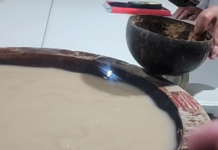Corrections to a decision by Acting Chief Justice Lord Afeaki in sentencing a prisoner last month appear to have followed a complaint to the king by senior lawyers querying his legal background.

Lord Afeaki, whose birth name is Tu’inukutavake Baron Afeaki, sentenced Siu’ivahanoa Tu’ipulotu on November 18.
Three copies of his judgement decision were filed as sentencing remarks and a corrigendum on the Attorney General Office’s website.
One judgement on November 18 read:
“Having considered the reasons provided above; the risk to the community and the need to keep people safe, the need to send the clear message to the public and would-be offenders that violent robberies will not be tolerated, the Defendant’s need for punishment and rehabilitation, and the need to provide some parity in sentences, the Defendant is convicted and sentenced to 2 1/2 years or 30 months’ imprisonment.
“The final nine months’ of his sentence is suspended for a period of two years from the date of the Defendant’s release from prison on the following conditions, namely, that during the said period, the Defendant is to:
- a) not to commit any offence punishable by imprisonment;
- b) be placed on probation;
- c) report to the probation office within 48 hours of his release from prison;
- d) complete a course in drug and alcohol awareness as directed by his probation officer; and 14 e) complete 40 hours community service as directed by his probation officer.
Failure to comply with the above conditions may result in the suspension being rescinded, in which case, the Defendant will be required to serve the balance of his sentence”.
A variation of the same decision by Lord Afeaki for the same prisoner labelled “Sentencing Remarks” on the same day, November 18, read:
“Result 61. Having considered the reasons provided above; the risk to the community and the need to keep people safe, the need to send the clear deterrent message to the public and would-be offenders that violent robberies will not be tolerated, the Defendant’s need for punishment and rehabilitation, and the need to provide some parity in sentences, the Defendant is convicted and sentenced to 2 1/2 years or 30 months’ imprisonment. Upon release, he will also:
- a) be placed on probation for 12 months;
- b) report to the probation office within 48 hours of his release from prison;
- c) complete a course in drug and alcohol awareness as directed by his probation officer;
and d) complete 40 hours’ community service as directed by his probation officer.
The varied version was marked as “Corrigendum” and was filed at the website as the third document relating to the sentencing of the same prisoner on November 18. It showed the Attorney General Office’s stamp and an initial on November 22.
“Pursuant to the order of the Court dated 22 November 2021, the following
sentencing remarks are to replace those issued on 18 November 202i”, the Corrigendum read.
Corrigendum means correction.
There is no written document on the website to say exactly why the corrections were made to the Lord Afeaki’s decision.
The corrections
In his first decision he suspended the final nine months of Tu’ipulotu’s sentence for a period of two years from the date of his release from prison.
In his correction version the suspension was removed. There were also minor changes to wordings of the original decision.
The changes came after Tongan lawyers called on the king to revoke Lord Afeaki’s appointment as Acting Lord Chief Justice.
Lord Afeaki was the lawyer and Lord Chancellor of the Privy Council.
His appointment as Acting Lord Chief Justice in October was made to fill the gap left by Lord Chief Justice Michael Whitten’s absence on holiday in Australia.
However, a group of lawyers – mostly members of the Tonga Law Society – were concerned about whether Lord Afeaki had sufficient legal experience to hold such an important position and complained to the king.
“The appointment is tainted with cronyism, personal interest and self-promotion within the Panel,” the lawyers told His Majesty.
“There is a conflict of interest with the Chairperson appointing himself to the position of Acting Lord Chief Justice.
“The Panel is established to consider suitably qualified and appropriate candidates for judicial office and is not established for the promotion of its members to the Judiciary. The decision is not transparent and is wrong”.
The changes have again brought to light the problems which were found in the Pursglove review that the current political system, including the judiciary, courts and the Privy Council, is unworkable and incompatible with the principles of constitutional monarchy and democracy.
Lord Chancellor above the law
According to Pursglove, the office of Lord Chancellor is not a judicial office, but an administrative office akin to that of a Minister and the Lord Chancellor should be answerable to Parliament like any other Minister. However, unlike the Minister of Justice who is answerable to Parliament, the courts and the people for his actions, the “independence” of the Lord Chancellor, under the Constitution, makes him unaccountable and places him above the law.
Good governance requires that there must be complete openness, transparency and accountability on the part of those who administer the Judiciary. The lack of accountability by the Lord Chancellor is incompatible with the principles of democracy and accountability upon which the Constitution of 2010 is founded, the report says.
FAKAMATALA FAKATONGA
Ko hono toe liliu ‘o fakatonutonu ko ia ha tu’utu’uni tautea ne fakahoko ‘e Looti Afeaki ko e ‘Eiki Fakamaau Lahi le’ole’o ia ‘a Tonga’ ka kuo ‘ikai fakamatala’i mai e ‘uhinga ‘o e liliu’ kuo muimui atu ia he tu’a ‘o hano lāunga’i ia ‘e he kau loea Tonga’ ki he tu’i’ ‘o ‘ekea ‘ene taukei fakalao ki he lakanga pelepelengesi ko ‘eni ‘o e fonua’. Na’e tautea’i‘e Looti Afeaki ‘a e tangata ko Siu’ivaha Tu’ipulotu ke ngāue pōpula ta’u ‘e ua mo e konga ‘i Nōvema ‘aho 18 kae toloi ‘a e māhina ‘e hiva fakamuimui’. Ne ‘osi e tu’utu’uni ko ‘eni’ mo hono lekooti fakapepa kuo toe tuku ange mai ‘e he uepi ‘a e ‘Ōfisi ‘o e ‘Āteni Seniale’ ha tatau ‘o e tu’utu’uni ki he tokotaha faihia tatau pe kae hā ai ‘oku liliu e tu’utu’uni ‘a Looti Afeaki’ ‘o to’o e tautea toloi māhina ‘e hiva’. Na’e toe muimui atu ai mo ha toe tatau ‘o ha tu’utu’uni hono tolu ‘a Looti Afeaki ki he taha tatau pe kae fakalea ‘eni ko e fakatonutonu ki he ‘uluaki tu’utu’uni pe ‘oku ‘iloa fakalao ko e Corrigendum. Na’e fakamahino heni kuo to’o ‘aupito ‘a e tautea toloi ‘o Tu’ipulotu’ pea ‘i ai mo e toe fanga ki’i liliu kehe iiki pe mei he fakalea ‘i he ‘uluaki tu’utu’uni ne fai’. Ko e tu’i’ pe ‘oku ne mafai ki hono fakanofo ‘o e lakanga ‘Eiki Fakamaau Lahi ‘i ha fale’i ‘ene pēnolo’. Ka ko Looti Afeaki pe ‘oku sea he pēnolo ko ‘eni’ pea ko hono fakanofo ki he lakanga Sea ko ia’ ne toe fai pe ki he finangalo ‘o e tu’i’. Na’e lāuga’i ‘a hono fakanofo ‘o Afeaki ki he lakanga fakamāu’ ‘e he kau loea ‘o Tonga’ mo ‘ekea ‘ene taukei fakalao ki he lakanga mahu’inga fau ko ‘eni. Taha ‘eni e me’a ne fakaanga’i lahi ai ‘a e mafai kuo ‘oange ‘e he konisitūtone’ fo’ou ‘o e 2010 ki he tu’i he ‘oku ‘ikai ha toe me’asivi ke ne ta’ota’ofi mo fakapapau’i ‘e ‘ikai hao atu ha ni’ihi ta’etaukei ki he lakanga’ni he ‘oku fakatu’utāmaki ia ki he fakamaau totonu’ mo e fonua’ fakalukufua. Oku toe langa’i heni e ngaahi fakaanga ne ‘asi he lipooti ‘a e mataotao he Konisitūtone’ ne ‘omi ‘e he pule’anga ‘o Tu’ivakanoo’ he 2014 ke ne vakai’i e konisitūtone lolotonga ‘a Tonga’. Ne pehē ‘e he mataotao’ ni ko e konisitūtone ma’olalo taha ia he ngaahi fonua Kominiueli. Pea ko e lakanga ‘o e Lord Chancellor a ‘eni ‘oku ma’u ‘e Afeaki ‘oku ma’olunga ia he lao’, ‘ikai lava e lakanga ‘o ngāue lelei mo tau’atāina, ‘ikai ‘ata ki tu’a pe tali ui ki ha taha pea ‘oku fepaki mamahi ia mo e ngaahi tefito’i mo’oni ‘o e fa’unga fakatemokalati’.







